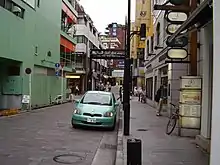Motomachi, Yokohama
Motomachi (元町) is a district of Naka Ward in Yokohama, Japan, located immediately west of Yamate and east of Chinatown. It consists mainly of the Motomachi Shopping Street, a five-block long stretch of boutiques and shops, well known in Japan for its cosmopolitan atmosphere, original fashion, and Western influence.

History
Motomachi was originally a quiet farming and fishing village until 1859, when the Port of Yokohama was opened. Since then, the close-by Kannai district became the foreigners' business district, and the adjacent Yamate and Yamashitacho districts became the foreigners' residential districts. Situated in-between, with Yamate to the east, and Kannai and Yamashitacho to the west, Motomachi became frequented by many foreigners. Shops and businesses were opened, catering to the needs of foreigners.[1]
In the early years of the Meiji era, there was a notable increase in the foreign population in Motomachi. This influx brought about a growing Western influence, leading to the establishment of various cafés, bakeries, and boutiques. These establishments were relatively uncommon in Japan at that time, and Motomachi played a role in introducing aspects of Western culture, contributing to the era known as "bunmei kaika" or cultural enlightenment. This marked the initial stages of what is now recognized as the Motomachi Shopping Street.
During the 1970s, the "Motomachi Shopping Street" became a catalyst for a unique fashion style known as "hama tora" (short for "Yokohama traditional"). This style was popularized by renowned boutiques like Kitamura, Mihama, and Fukuzō, which were prominent in Motomachi's fashion scene at the time.
Naming
Upon the opening of the Port of Yokohama in 1859, this area was called Motomura (本村). The name was changed to Motomachi in 1860.
Education
Motomachi is zoned to Motomachi Elementary School (元街小学校), which feeds into Minato Junior High School (横浜市立港中学校).[2]
Notes
- Corkill, Edan, "Traders' plans pay off in Motomachi", Japan Times, 24 May 2009, p. 8.
- "小・中学校等の通学区域一覧(通学規則 別表)". City of Yokohama. Retrieved 2022-10-21.
References
- This article was translated from the corresponding article in the Japanese Wikipedia, retrieved on September 9, 2006, and with a few minor changes.